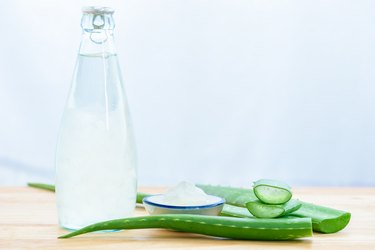
Aloe vera, known for its topical healing qualities, has also been lauded as a health aid. But a number of these claims have not been medically proven. Because aloe's active ingredients degrade quickly once processed, properly storing aloe vera juice is essential to retaining any benefits.
What Is Aloe Vera Juice?
Video of the Day
Aloe vera juice is made from the gel contained within the leaves of the aloe vera plant. It's comprised mostly of water but also includes glycoproteins and polysaccharides, which are both substances that suppress inflammation and stimulate the immune system.
Video of the Day
Although the National Institutes of Health reports that high-quality scientific evidence to support the medicinal use of aloe vera is lacking, aloe vera gel and aloe vera juice products are available in many health food and grocery stores.
The Memorial Sloan Kettering Cancer Center notes that aloe, including the plant's juice, has been studied for positive effects on skin issues as well as internal issues like constipation and diabetes. The center also mentions studies indicating potential anti-inflammatory and antioxidant effects.
A July 2017 review of antiseptic use published by the Cochrane Library of Systematic Reviews showed that pain may be reduced more from baseline in burns treated with aloe vera than those treated with some other substances.
Read more: Eight Natural and Soothing Sunburn Remedies
Storing Aloe Vera Juice
Whether your aloe vera juice is made from scratch at home or purchased from the store, understanding aloe vera juice storage information is crucial. The juice should be consumed soon after it's made or refrigerated immediately thereafter.
Commercial products usually contain preservatives, so they can keep in the refrigerator for several months — longer than if you make it fresh. Read the bottle's label for storage instructions and follow them accordingly. If you make your own juice, make just what you'll drink in the moment and if you have to store any leftovers keep them in the fridge for just a few days and discard any unconsumed portion after that time.
But it's important to note here that drinking and storing aloe vera juice should be undertaken with some caution. According to a study published in March 2016 in Journal of Environmental Science and Health, aloe vera taken internally may be associated with health problems such as diarrhea, hypokalemia, pseudomelanosis coli, kidney failure, phototoxicity and hypersensitive reactions.
Tips for Homemade Use
Aloe vera juice is made by combining the inner liquid of the plant with juice, water or tea to make it more palatable. If you have your own your aloe vera plant at home and want to make your own juice, choose large, healthy-looking leaves and pick them close to the stem of the plant. With a knife or using your fingers, open the leaf and quickly separate the inner gel from the outside skin. Make sure to discard the yellow sap, known as aloe latex, that is just beneath the green rind. It is a strong laxative.
To make aloe vera juice, fully blend 2 tablespoons of gel with one cup of citrus juice such as orange or grapefruit in a blender or food processor. Drink the aloe vera juice immediately after it's been made or store in the refrigerator for up to two days.
Aloe as a Dietary Supplement
As the Mayo Clinic notes, aloe vera juice when processed and stored properly is safe to consume for most people when used as recommended. (But as the Mayo Clinic also mentions, make sure to avoid the yellow aloe latex found within the leaves, despite claims that it can help with constipation.)
It's also worth keeping in mind that there is as yet no hard scientific evidence backing claims that aloe vera juice when taken internally contains healing qualities. According to the National Institute of Environmental Health Sciences, aloe vera is considered a dietary supplement and not a regulated drug.
Read more: How to Treat Steam Burns
If you are pregnant or are experiencing a diagnosed health issue, consult your doctor before consuming aloe vera juice. Remember to check the expiration date on store-bought juice before drinking. If it's expired, discard the remaining product. If you make it yourself, drink it quickly and don't keep it in the fridge for more than a day or two.
- Memorial Sloan Kettering Cancer Center: "Aloe Vera"
- U.S. Department of Health and Human Services: National Institutes of Health: "Aloe Vera"
- Cochrane Library: "Antiseptics for Burns"
- National Institute of Environmental Health Sciences: "Aloe Vera"
- International Food Information Council Foundation: "Is Aloe Vera a "Superjuice"?"
- Nutrition Facts: "Are There Benefits to Drinking Aloe Vera Juice?"
- International Aloe Science Council: "Aloe Vera: Frequently Asked Questions"
- Journal of Medicinal Food: "Glycoproteins and Polysaccharides Are the Main Class of Active Constituents Required for Lymphocyte Stimulation and Antigen-Specific Immune Response Induction by Traditional Medicinal Herbal Plants"
- Mayo Clinic: "Aloe"
- Baylor College of Medicine: "Using Aloe Vera Has Multiple Benefits"
- Journal of Environmental Science and Health: "Aloe Vera: A Review of Toxicity and Adverse Clinical Effects"